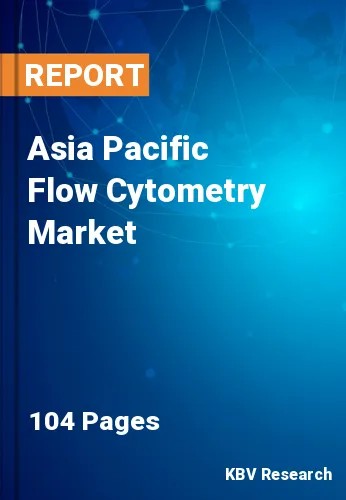Chapter 1. Market Scope & Methodology
1.1 Market Definition
1.2 Objectives
1.3 Market Scope
1.4 Segmentation
1.4.1 Asia Pacific Flow Cytometry Market, by Application
1.4.2 Asia Pacific Flow Cytometry Market, by End User
1.4.3 Asia Pacific Flow Cytometry Market, by Technology
1.4.4 Asia Pacific Flow Cytometry Market, by Component
1.4.5 Asia Pacific Flow Cytometry Market, by Country
1.5 Methodology for the research
Chapter 2. Market Overview
2.1 Introduction
2.1.1 Overview
2.1.1.1 Market composition and scenario
2.2 Key Factors Impacting the Market
2.2.1 Market Drivers
2.2.2 Market Restraints
Chapter 3. Competition Analysis - Global
3.1 KBV Cardinal Matrix
3.2 Recent Industry Wide Strategic Developments
3.2.1 Partnerships, Collaborations and Agreements
3.2.2 Product Launches and Product Expansions
3.2.3 Acquisition and Mergers
3.2.4 Acquisition and Mergers
3.3 Top Winning Strategies
3.3.1 Key Leading Strategies: Percentage Distribution (2018-2022)
Chapter 4. Asia Pacific Flow Cytometry Market by Application
4.1 Asia Pacific Academic & Clinical Market by Country
4.2 Asia Pacific Diagnostic Market by Country
Chapter 5. Asia Pacific Flow Cytometry Market by End User
5.1 Asia Pacific Commercial Organizations Market by Country
5.2 Asia Pacific Hospitals Market by Country
5.3 Asia Pacific Academic Institutions Market by Country
5.4 Asia Pacific Medical Schools & Clinical Testing Labs Market by Country
5.5 Asia Pacific Other End User Market by Country
Chapter 6. Asia Pacific Flow Cytometry Market by Technology
6.1 Asia Pacific Cell Based Market by Country
6.2 Asia Pacific Bead Based Market by Country
Chapter 7. Asia Pacific Flow Cytometry Market by Component
7.1 Asia Pacific Instruments Market by Country
7.2 Asia Pacific Reagents & Consumables Market by Country
7.3 Asia Pacific Software Market by Country
7.4 Asia Pacific Services Market by Country
Chapter 8. Asia Pacific Flow Cytometry Market by Country
8.1 China Flow Cytometry Market
8.1.1 China Flow Cytometry Market by Application
8.1.2 China Flow Cytometry Market by End User
8.1.3 China Flow Cytometry Market by Technology
8.1.4 China Flow Cytometry Market by Component
8.2 Japan Flow Cytometry Market
8.2.1 Japan Flow Cytometry Market by Application
8.2.2 Japan Flow Cytometry Market by End User
8.2.3 Japan Flow Cytometry Market by Technology
8.2.4 Japan Flow Cytometry Market by Component
8.3 India Flow Cytometry Market
8.3.1 India Flow Cytometry Market by Application
8.3.2 India Flow Cytometry Market by End User
8.3.3 India Flow Cytometry Market by Technology
8.3.4 India Flow Cytometry Market by Component
8.4 South Korea Flow Cytometry Market
8.4.1 South Korea Flow Cytometry Market by Application
8.4.2 South Korea Flow Cytometry Market by End User
8.4.3 South Korea Flow Cytometry Market by Technology
8.4.4 South Korea Flow Cytometry Market by Component
8.5 Singapore Flow Cytometry Market
8.5.1 Singapore Flow Cytometry Market by Application
8.5.2 Singapore Flow Cytometry Market by End User
8.5.3 Singapore Flow Cytometry Market by Technology
8.5.4 Singapore Flow Cytometry Market by Component
8.6 Malaysia Flow Cytometry Market
8.6.1 Malaysia Flow Cytometry Market by Application
8.6.2 Malaysia Flow Cytometry Market by End User
8.6.3 Malaysia Flow Cytometry Market by Technology
8.6.4 Malaysia Flow Cytometry Market by Component
8.7 Rest of Asia Pacific Flow Cytometry Market
8.7.1 Rest of Asia Pacific Flow Cytometry Market by Application
8.7.2 Rest of Asia Pacific Flow Cytometry Market by End User
8.7.3 Rest of Asia Pacific Flow Cytometry Market by Technology
8.7.4 Rest of Asia Pacific Flow Cytometry Market by Component
Chapter 9. Company Profiles
9.1 Becton, Dickinson and Company
9.1.1 Company Overview
9.1.2 Financial Analysis
9.1.3 Segmental and Regional Analysis
9.1.4 Research & Development Expense
9.1.5 Recent strategies and developments:
9.1.5.1 Partnerships, Collaborations, and Agreements:
9.1.5.2 Acquisition and Mergers:
9.1.5.3 Approvals and Trials:
9.2 Thermo Fisher Scientific, Inc.
9.2.1 Company Overview
9.2.2 Financial Analysis
9.2.3 Segmental and Regional Analysis
9.2.4 Research & Development Expense
9.2.5 Recent strategies and developments:
9.2.5.1 Product Launches and Product Expansions:
9.2.5.2 Acquisition and Mergers:
9.3 Danaher Corporation
9.3.1 Company Overview
9.3.2 Financial Analysis
9.3.3 Segmental and Regional Analysis
9.3.4 Research & Development Expense
9.3.5 Recent strategies and developments:
9.3.5.1 Product Launches and Product Expansions:
9.4 Agilent Technologies, Inc.
9.4.1 Company Overview
9.4.2 Financial Analysis
9.4.3 Segmental and Regional Analysis
9.4.4 Research & Development Expense
9.4.5 Recent strategies and developments:
9.4.5.1 Product Launches and Product Expansions:
9.4.5.2 Acquisition and Mergers:
9.5 BioMérieux S.A.
9.5.1 Company Overview
9.5.2 Financial Analysis
9.5.3 Segmental and Regional Analysis
9.5.4 Research & Development Expenses
9.5.5 Recent strategies and developments:
9.5.5.1 Acquisition and Mergers:
9.6 Bio-Rad laboratories, Inc.
9.6.1 Company Overview
9.6.2 Financial Analysis
9.6.3 Segmental and Regional Analysis
9.6.4 Research & Development Expenses
9.7 DiaSorin S.p.A.
9.7.1 Company Overview
9.7.2 Financial Analysis
9.7.3 Regional Analysis
9.7.4 Research & Development Expenses
9.8 Miltenyi Biotech B.V. & Co. KG
9.8.1 Company Overview
9.9 Sartorius AG
9.9.1 Company Overview
9.10. Sysmex Corporation
9.10.1 Company Overview
9.10.2 Financial Analysis
9.10.3 Regional Analysis
9.10.4 Research & Development Expense
9.10.5 Recent strategies and developments:
9.10.5.1 Product Launches and Product Expansions:

